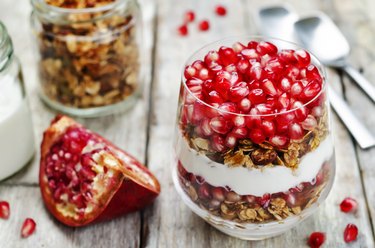
The term "gut health" gets thrown around a lot, so let's uncover the mystery behind it. Gut health refers to the environment in your gut and the bacteria that live there.
Many factors affect your gut, like the foods that you eat (and those you don't), along with medications you might be taking and other lifestyle factors.
Video of the Day
Video of the Day
Gut-friendly foods are those that benefit your gut microbiome; they can be beneficial bacteria (probiotics) or a fuel source for the good bacteria (prebiotics and polyphenols). Others gut-healthy foods help to maintain a proper working gut and digestive system, like dietary fiber and digestive enzymes.
Eating a variety of these foods for gut health can help ensure that you're nourishing your gut and the bacteria that live there.
1. Pomegranates
Pomegranates and their juice are rich in polyphenols and antioxidants.
An older January 2008 study in Agriculture and Food Chemistry found that pomegranate juice ranks number one in total polyphenol content and antioxidant capacity compared to red wine, iced tea (black, green and white) and grape, blueberry, black cherry acai, cranberry and orange juice.
This is important for gut health because certain polyphenols act as prebiotics, a food source for the good bacteria in our guts. Pomegranate juice and extract significantly increased beneficial bacteria like Bifidobacterium and Lactobacillus and significantly inhibited the growth of harmful bacteria in an August 2015 in vitro study in Anaerobe.
When buying pomegranate juice, look for brands that state "100 percent pomegranate juice" and read the ingredients list to make sure other juices, like cranberry and grape, have not been added.
Brands We Love:
- POM Wonderful 100% Pomegranate Juice ($3.89 on Target)
- R.W. Knudsen Just Pomegranate Juice ($7.99 on Instacart)
Recipes to Try:
How to Turn a Pomegranate Into 7 Savory, Antioxidant-Rich Meals and Sides
2. Kefir
You're familiar with yogurt but have you ever tried kefir? Like yogurt, kefir is a fermented product, but yogurt is made with bacteria while kefir is made with bacteria and yeast, as outlined in a January 2020 paper in Microorganisms.
Like yogurt, kefir is a rich source of probiotics, which is good news for our gut. A July 2019 study in the Turkish Journal of Gastroenterology found that after drinking a daily kefir beverage for four weeks, people experienced increased stool frequency and consistency and decreased laxative use compared to baseline in a small group with chronic constipation.
Brands We Love:
- Lifeway Kefir Plain Unsweetened Cultured Lowfat Milk ($2.78 on Instacart)
- Maple Hill 100% Grass-Fed Organic Kefir ($8.29 on Instacart)
- GT's Coco Kefir ($5.99 on Instacart)
Recipes to Try:
How to Turn a Bottle of Kefir Into a Week’s Worth of Probiotic, High-Protein Breakfasts
3. Papaya
Papaya probably doesn't make your weekly shopping list, but if you're trying to eat for better gut health, you may want to consider adding this fruit to your next haul.
Papaya is nutrient-rich and a source of dietary fiber and, like its tropical friends mango and pineapple, it's a natural source of digestive enzymes.
Digestive enzymes help our bodies break down the foods we eat. They also improve the absorption of nutrients from food. Papaya contains the digestive enzyme papain, which helps to break down protein.
4. Jerusalem Artichokes
All vegetables contain some dietary fiber, but only some are rich in prebiotics, according to Monash University. Jerusalem artichokes — also called sunchokes — are a rich source of prebiotics, which means they're a food source for the good bacteria in your gut.
Prebiotics resist digestion and aren't broken down until they reach the large intestine, as outlined in an April 2013 study in Nutrients. It's the probiotics in your colon that break down or use the prebiotics as fuel, which is one reason they're so good for gut health.
Another reason: When prebiotics break down through fermentation, short-chain fatty acids are released — and these have beneficial effects, too. In fact, prebiotics have been linked to improved gut barrier function, increased overall immunity, reduced risk of attack from harmful bacteria, colon cancer prevention and decreased inflammation associated with inflammatory bowel disease, per the Nutrients study.
Recipes to Try:
5. Sauerkraut
Sauerkraut, which is fermented cabbage, contains 24 strains of good bacteria, according to an August 2019 review in Nutrients.
There are limited studies on the benefits of sauerkraut but one that focuses on the fermented vegetable and irritable bowel syndrome found that after eating it for six weeks, people saw a significant reduction in symptoms. The interesting piece to this, however, is that improvement was seen in both the control (pasteurized sauerkraut) and the treatment group (unpasteurized sauerkraut).
The pasteurization process kills probiotics, so the study authors think that kraut's gut health benefits come from something other than live probiotics.
- Journal of Agriculture and Food Chemistry: "Comparison of Antioxidant Potency of Commonly Consumed Polyphenol-Rich Beverages in the United States"
- Anaerobe: "Pomegranate Ellagitannins Stimulate Growth of Gut Bacteria in Vitro: Implications for Prebiotic and Metabolic Effects"
- Microorganisms: "A Big World in Small Grain: A Review of Natural Milk Kefir Starters"
- Turkish Journal of Gastroenterology: "Effects of a Kefir Supplement on Symptoms, Colonic Transit, and Bowel Satisfaction Score in Patients With Chronic Constipation: A Pilot Study"
- Monash University: "Prebiotic Diet"
- Nutrients: "Fiber and Prebiotics: Mechanisms and Health Benefits"
- Nutrients: "Fermented Foods: Definitions and Characteristics, Impact on the Gut Microbiota and Effects on Gastrointestinal Health and Disease"